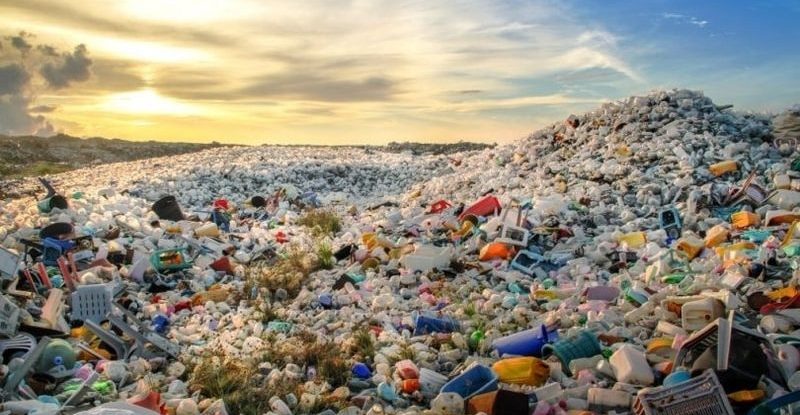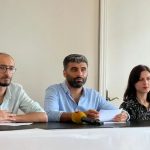“We went to the Recycle Industrialists’ Estate in Adana to investigate the waste imported to Türkiye from Europe. We sat down and had a chat with one of the largest firms in the sector. But when we were about to leave, another executive of the company began shouting at us. He labeled as us ‘spies, terrorists.’
“He followed us after we left the factory. He came to us with a few other people. He forced me to go to the factory and to talk. He threatened me with a weapon. There was also a beating.
“When we said we were going to call the police, he took the memory card of my camera and let us go. But even when we were leaving, he continued threats like, ‘This will not end here, we will meet again.’
“He was after us almost until the exit of Adana. I’m used to incidents of violence as a journalist, but it was the first time such a thing has happened to me.”
This is Vedat Örüç’s account of what happened on July 27, while they were taking down the waste sent to Türkiye, which has become Europe’s largest waste importer over the past four years. Most of the imported waste comes to the southern Adana province.
An independent journalist, he was working on a story together with his colleagues Elif Kurttaş for P24.
“I was scared. I was scared a lot”
Kurttaş, a reporter for İMECE Haber, a local outlet in Mersin, a province adjacent to Adana, said, “Our lives were at risk there and we were scared.”
“I was scared. I was scared a lot. They took away Vedat. I was very worried about him. Because he was the target,” she said, adding, “Facing an incident of violence does not prevent me from doing my job. But it caused me to worry about the future. If we couldn’t leave there, there would be a life-threatening situation.”
Attacks on environmental reporters
Attacks on environmental reporters are increasing around the world. According to the Reporters Without Borders (RSF), at least 10 environmental reporters were killed and 53 experienced rights violations between 2015 and 2020.
The reporters were from various places around the world, including Canada, Uganda, the Philippines, Pakistan, India, Colombia, Mexico, Thailand, France, Uzbekistan, and Russia.
“Sweeping the problems under the rug”
According to Erol Önderoğlu, the RSF representative in Türkiye and bianet’s media freedom rapporteur, there are two aspects of the interventions in environmental reporting in Türkiye: putting the media under pressure because environmental reporting reveals negligence and wrong policies, and the investors trying to silence journalists because they don’t want to lose their interests.
“Unfortunately, Türkiye looks like a country where channels to obtain information are pretty closed, environmental problems are swept under the rug and obstacles are put in the way of journalism when political and economic calculations come into play,” he said.
While Türkiye was not on the RSF’s 2020 list, it might be included in the future, judging by the events in the last two years, he added.
Impunity
The figures of the Committee to Protect Journalists (CPJ), which has been keeping track of the killed journalists since 1992, are similar to those of the RSF.
At least 30 environmental reporters were killed in the last 10 years because of their work, according to the group.
Özgür Öğret, the CPJ representative in Türkiye, said, “As long as impunity continues, the people who will carry out the next attack are encouraged.”
“If there is a fire in the country, it will of course be reported, and if there are deficiencies in the response, these will of course be included in the news.
“If garbage and waste are imported into the country, journalists will, of course, report this and its effects. If there are institutions operating in violation of the laws of the country and ignoring human and environmental health, the journalists will certainly pursue it.
“If there is a functioning political mechanism in this country, journalists, commentators, and writers will naturally talk about the situation and criticize it.
“If the perpetrators are either not found, are not prosecuted, or receive ridiculous sentences when this normal functioning of journalism is attacked, it means that the authorities don’t want journalism in the country and are targeting the journalists who should be protected.
“The only thing the authorities in Türkiye need to do, to begin doing at one point, is to show within the legal framework that there is a price for attacking journalists.”
Türkiye’s plastic waste importsTürkiye’s plastic waste imports rapidly increased after early 2018, when China imposed bans on waste imports. In 2019 and 2020, Türkiye was the largest importer of Europe’s plastic waste. According to Eurostat and UK Office for National Statistics figures compiled by Greenpeace; Türkiye imported 659,960 tons of plastic waste from the EU countries and the UK in 2020, up by 13 percent from the previous year. Some 241 truckloads of plastic waste came to Türkiye from those countries every day. • In 2019, Türkiye imported 582,296 tons of plastic waste from the EU countries and the UK. • Twenty-eight percent of Europe’s plastic waste exports were to Türkiye in 2020. • Türkiye’s plastic waste imports increased by 196 times between 2004 and 2020. • In 2020, the top five countries that sent the most plastic waste to Türkiye were the UK (209,642 tons), Belgium (137,071 tons), Germany (136,083 tons), the Netherlands (49,496 tons) and Slovenia (24,884 tons). |
(HA/VK)
Source:Bianet
***Show us some LOVE by sharing it!***



